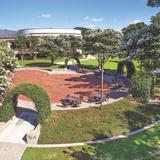- Hill College accepts as its mission the task of providing high quality comprehensive educational programs and services. The college strives to enhance the educational, cultural, and economic development of its service area and to assist both individuals and the community to prepare for a more productive life.
School Highlights
Hill College serves 4,707 students (32% of students are full-time).
The college's student-teacher ratio of 17:1 is lower than the state community college average of 23:1.
Minority enrollment is 46% of the student body (majority Hispanic), which is less than the state average of 74%.
Quick Facts (2026)
- Enrollment: 4,707 students
- In-state tuition: $2,840
- Out-state tuition: $3,240
- Student-teacher ratio: 17:1
- Minority enrollment: 46%
- Source: Integrated Postsecondary Education Data System (IPEDS)
Top Rankings
Hill College ranks among the top 20% of public schools in Texas for:
Category
Attribute
Affordability
School Overview
The teacher population of 270 teachers has stayed relatively flat over five years.
Hill College
(TX) Community College Avg.
Carnegie Classification
Associate's Colleges: High Transfer-High Nontraditional
Baccalaureate/Associate's Colleges: Associate's Dominant
Institution Level
At least 2 but less than 4 years
At least 2 but less than 4 years
Institution Control
Public
Public
Total Faculty
270 staff
262 staff
School Calendar
Student Body
The student population of Hill College has grown by 16% over five years.
The student-teacher ratio of 17:1 has decreased from 29:1 over five years.
The Hill College diversity score of 0.62 is less than the state average of 0.70. The school's diversity has grown by 13% over five years.
Total Enrollment
4,707 students
4,931 students
Student-Teacher Ratio
17:1
23:1
# Full-Time Students
1,527 students
909 students
# Part-Time Students
3,180 students
4,022 students
# Enrollment Undergraduate
470 students
403 students
# Full-Time Undergraduate Students
1,527 students
890 students
# Full-Time Graduate Students
n/a
40 students
# Part-Time Undergraduate Students
3,180 students
4,166 students
# Part-Time Graduate Students
n/a
47 students
Total Dormitory Capacity
288 students
252 students
% American Indian/Alaskan
1%
n/a
% Asian
1%
6%
% Hispanic
28%
46%
% Black
6%
13%
% White
54%
26%
% Hawaiian
n/a
n/a
% Two or more races
4%
3%
% Non Resident races
1%
2%
% Unknown races
5%
4%
Diversity Score
0.62
0.70
College Completion Rate (Students who graduate in less than 4 years)
29%
55%
College Completion Rate (Students who graduate in 4 years or more than 4 years)
n/a
34%
Average Graduate Earnings (10 Years)
$32,100
$34,600
Tuition and Acceptance Rate
The public in-state tuition of $2,840 is less than the state average of $3,764. The in-state tuition has declined by 24% over four years.
The public out-state tuition of $3,240 is less than the state average of $6,054. The out-state tuition has declined by 21% over four years.
In-State Tuition Fees
$2,840
$3,764
Out-State Tuition Fees
$3,240
$6,054
% Students Receiving Some Financial Aid
80%
84%
Median Debt for Graduates
$10,500
$10,765
Median Debt for Dropouts
$5,500
$5,500
Acceptance Rate
n/a
84%
Source: 2024 (or latest year available) Integrated Postsecondary Education Data System (IPEDS) , School Administrators
School Notes
- On March 3, 1962, through the efforts of the media, local civic groups, and many others, a bond issue was passed for the purpose of building a new campus. The college opened for business in September of 1962 under a new name, Hill Junior College. The new college district was expanded by the voluntary annexation of five Hill County school districts other than the original Hillsboro school district. The district now included Hillsboro, Abbott, Bynum, Covington, Itasca, and Whitney. In 1974, the college opened an extension center in Cleburne, Texas, located in Johnson County. The Johnson County Campus now includes six buildings on 32 acres of land and has more than 1,000 students enrolled in both day and night classes. In 1997 and 1998, the citizens of Alvarado, Cleburne, Godley, Grandview, Joshua, Keene, Rio Vista, and Venus approved a local maintenance and operation tax for the purpose of supporting the campus of Hill College in Johnson County. The college dropped 'junior' from its name in 1985 and became Hill College. The college campuses are located at Hillsboro, Cleburne, Glen Rose, Clifton, and a Virtual Campus accessible anywhere. Hill College campus area includes 73.8 acres of land located just east of the City of Hillsboro on a hill overlooking I 35 and the 35 acre Hill College Reunion Grounds. Following its relocation to this site in 1962, the student population has continued to grow, and the college has expanded its facilities in order to meet the needs of the community and its students. Twenty permanent buildings have been erected on the main campus with over 250,000 square feet of space. Hill College offers the Associate in Arts Degree, the Associate in Applied Science Degree, Certificate of Technology, and Certificate of Completion. Hill College is accredited by the commission on Colleges of the Southern Association of Colleges and Schools to award associate degrees.
Frequently Asked Questions
How much does Hill College cost?
Hill College's tuition is approximately $2,840 for In-State students and $3,240 for Out-State students.
What is Hill College's ranking?
Hill College ranks among the top 20% of community college in Texas for: Least expensive tuition.
Recent Articles

5 Key Community College Trends Parents Should Know in 2026
Explore major 2026 community college trends including enrollment changes, costs, career programs, and affordability for parents planning college decisions.

Average Community College Tuition Cost 2026 Update
Explore updated 2026 community college tuition averages, cost trends, planning tips, admissions timing advice, and financial strategies for families and students.

Preparing for Placement Tests in 2026: Student Guide
Preparing for Placement Tests in 2026, what students, parents, and educators need to know about formats, prep strategies, and placement changes.










